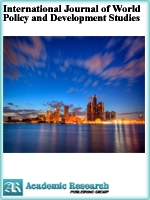International Journal of World Policy and Development Studies
Online ISSN: 2415-2331
Print ISSN: 2415-5241
Print ISSN: 2415-5241
Quarterly Published (4 Issues Per Year)

Archives
Volume 8 Number 2 December 2022
Amity and Enmity in Regional Integration; the East African Community (EAC) Experience
Authors: Dr. Thomas Otieno Juma
Pages: 57-65
DOI: doi.org/10.32861/ijwpds.82.57.65
Abstract
East African Community from a traditional three states to the current six states has undergone different experiences in her cooperation and integration process from the pre-independence, the independence era, and post-independence era which suits the definition of the contemporary era. The context of the contemporary global political economy revolves around a post-tripartite trading block among neighboring states, shaped by empirical theory (what is the question) as opposed to the normative theory of “what ought to be”. Such realities are relationships based in forms of amity and enmity in the process of competition between citizens/states over policy preferences and interests. The resultant effects lead to; first, shifts in patterns of cooperation and integration, and secondly, the existence of durability and endurability in cooperation and integration. After examination and assessment of the effects respectively in relation to the East African experience, this article/presentation proposes a need to transcend the above enmity for amity in East African Community Cooperation and Integration process. Underscoring the existence of amity and enmity in state cooperation and integration in a region such as EAC defines a Regional Security Complex due to socio-eco-political beneficial security interdependences and existing vs potential conflicts. The need for a unified developmental-centric approach through cooperation and integration by EAC from the foregoing prompts the need for the application of Regional Security Complex Theory (RSCT) by Buzan and Waver.
A Study of Formal Features of Chu Ci Translation and Research Texts in English Based on Variational Translation Theory
Authors: Caihuizi Guo ; Chuanmao Tian
Pages: 48-56
DOI: doi.org/10.32861/ijwpds.82.48.56
Abstract
The dissemination works of Chu Ci (楚辞) in Western countries can roughly be divided into three groups: translation works, research works and literary works. The formal features of the dissemination works are intimately related to and determined by the variational translation methods which include adaptation translation, selective translation, translation and comment, translation and writing, introduction-translation, edited translation, reference translation, condensed translation, and so on. Research on the textual features of Chu Ci dissemination works in the West is of great help to the globalization of Chinese culture, especially to ancient Chinese literary and cultural classics’ going global which is an important national policy of the Chinese government.
Environmental Vulnerability in Developing World: A Sociological Appraisal
Authors: Mohammad Taghi Sheykhi
Pages: 43-47
DOI: doi.org/10.32861/ijwpds.82.43.47
Abstract
Vulnerability of environment is very likely in most developing countries. Many people join the cities due to various reasons. Droughts in rural areas, rise of literacy and education, modern skills learnt by young generations in rural areas, higher expectations of the ruralites and many more, push these people to cities where they are unexpected, creates problems and damages as far as the environment is concerned. To accommodate the people, many green spaces are vanished to build accommodations. Similarly, to make earnings, work places must be built, and for that many natural environments must be substituted by built environments. In the meantime, a lot of more transportation occupies the streets. Besides that, cities become polluted areas, and the whole life is damaged. Such a situation physically and spritually affect the people in urban areas. However, managing different classes of people in a metropolitan is really hard to do. In this way, a sort of class gap is created and observed within the urbanites of the developing world.
Effect of Farmers’ Participation in NGO Interventions on Household Food Security in Yatta Sub County, Machakos County Kenya
Authors: Edwin Omwoyo Onyancha ; Florence Ondieki-Mwaura ; Lawrence Njoroge
Pages: 34-42
DOI: doi.org/0.32861/ijwpds.82.34.42
Abstract
The purpose of this paper is to understand the extent to which farmers’ participation in NGO interventions affect their household food security in Yatta Sub County of Machakos County, Kenya. This study assessed farmers’ participation in needs identification, selection of interventions, implementation and monitoring. The study applied mixed method approach to collect both quantitative and qualitative data. This involved a cross-sectional survey of 357 farmers selected from 100 farmers’ groups that had worked with NGOs for more than three years, 6 focus group discussions (5 with farmers and one with NGOs), 33 key informant interviews, as well as 2 case studies. Quantitative data was analysed using logistic regression model. Findings reveal that there is a significant relationship between farmers’ participation in NGO interventions and household food security outcomes. In needs identification, NGOs mainly engaged farmers in joint meetings as opposed to formalized assessments. Selection of interventions was done through consultative meetings, while implementation was carried out in farmer plots and demonstration plots. Farmers participated in monitoring through project management committees, quarterly review meetings and feedback sessions. However, there was no standardized protocols of applying participation among NGOs. Sometimes unstructured needs assessment, hurried selection of interventions and lack of skills among farmers to negotiate with NGOs for preferred interventions negatively impacted farmers’ participation. The study is useful in informing NGOs and funding agencies to strengthen farmers’ participation in NGO interventions. NGOs should develop standardized participation protocols, which are engrained in their contracts with farmers to enhance uniformity and accountability.



